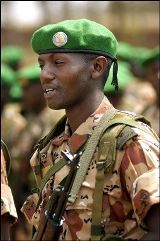African Union seeks up to 5,000 troops for Darfur
By Evelyn Leopold
UNITED NATIONS, Sept 24 (Reuters) – The African Union will determine in early October whether it can mobilize a 3,000- to 5,000-strong force to help stop atrocities in Sudan’s Darfur region, Nigerian President Olusegun Obasanjo said on Thursday.
 Obasanjo, whose country heads the 53-nation African Union, told a news conference, “We are talking of 3,000 basic troops minimum, 5,000 at the outside” from five nations, which will probably include Nigeria and Rwanda.
Obasanjo, whose country heads the 53-nation African Union, told a news conference, “We are talking of 3,000 basic troops minimum, 5,000 at the outside” from five nations, which will probably include Nigeria and Rwanda.
On Saturday, the U.N. Security Council adopted a resolution calling for the deployment of a large African Union force to investigate abuses and serve as a bulwark against further violence in Darfur, where Arab militia are accused of killing, raping and burning down African villages.
Nigeria hopes for $200 million in contributions from wealthy countries or help with transport and logistics. Canadian Prime Minister Paul Martin on Monday said he would contribute the equivalent of $16 million.
Some 50,000 people have died in the last 19 months, 1.3 million civilians had been uprooted from their homes and 2 million people are in need of relief in Darfur, U.S. and U.N. officials say.
GENOCIDE?
The U.S. Congress and Secretary of State Colin Powell have labeled the violence genocide. The Security Council asked U.N. Secretary-General Kofi Annan to appoint a commission and determine whether genocide occurred.
But Obasanjo disagreed, saying genocide means the government intended to wipe out a particular group of people.
“We know is that there was an uprising, a rebellion, and the government armed another group of people to stop that rebellion,” he said. “That does not amount to genocide, from our own reckoning. It amounts to conflict. It amounts to violence.”
“I have been in this type of thing before and I know what it is,” he added.
Rebels began an uprising in Darfur in February 2003 after years of skirmishes between mainly African farmers and Arab nomads over land and water in an area as large as France. Sudan is accused of arming and fighting with the militia, known as Janjaweed, to quell the conflict.
But Sudanese Foreign Minister Mustafa Osman Ismail characterized the conflict as an uprising by African rebels and a dispute among tribes, caused in part by an increase in population, livestock and the encroachment of deserts.
“The government then interfered to spread peace and to prevent civil war,” he told the U.N. General Assembly.
He listed Khartoum’s efforts to cooperate with international demands but said the U.N. Security Council, which also threatened to impose oil sanctions, ignored them.
“The door is open for all those who want to know the truth. We have nothing to hide,” Ismail said. “We call upon the international community to help the needy … and not to complicate the situation on the ground and undermine the efforts of the African Union.”
Obasanjo is trying to negotiate a peace deal with between the rebels and the government. The talks collapsed recently but he said they would resume about Oct. 21.
Sudan’s foreign minister however, said the deadlock was caused by the Security Council’s resolutions, “which sent an erroneous message to the rebels.”
Currently, the African Union has some 80 observers in the Darfur region with 300 troops to guard them. They are there to monitor a faltering cease-fire between the rebels and the government but the Security Council has said the mandate should be expanded.
